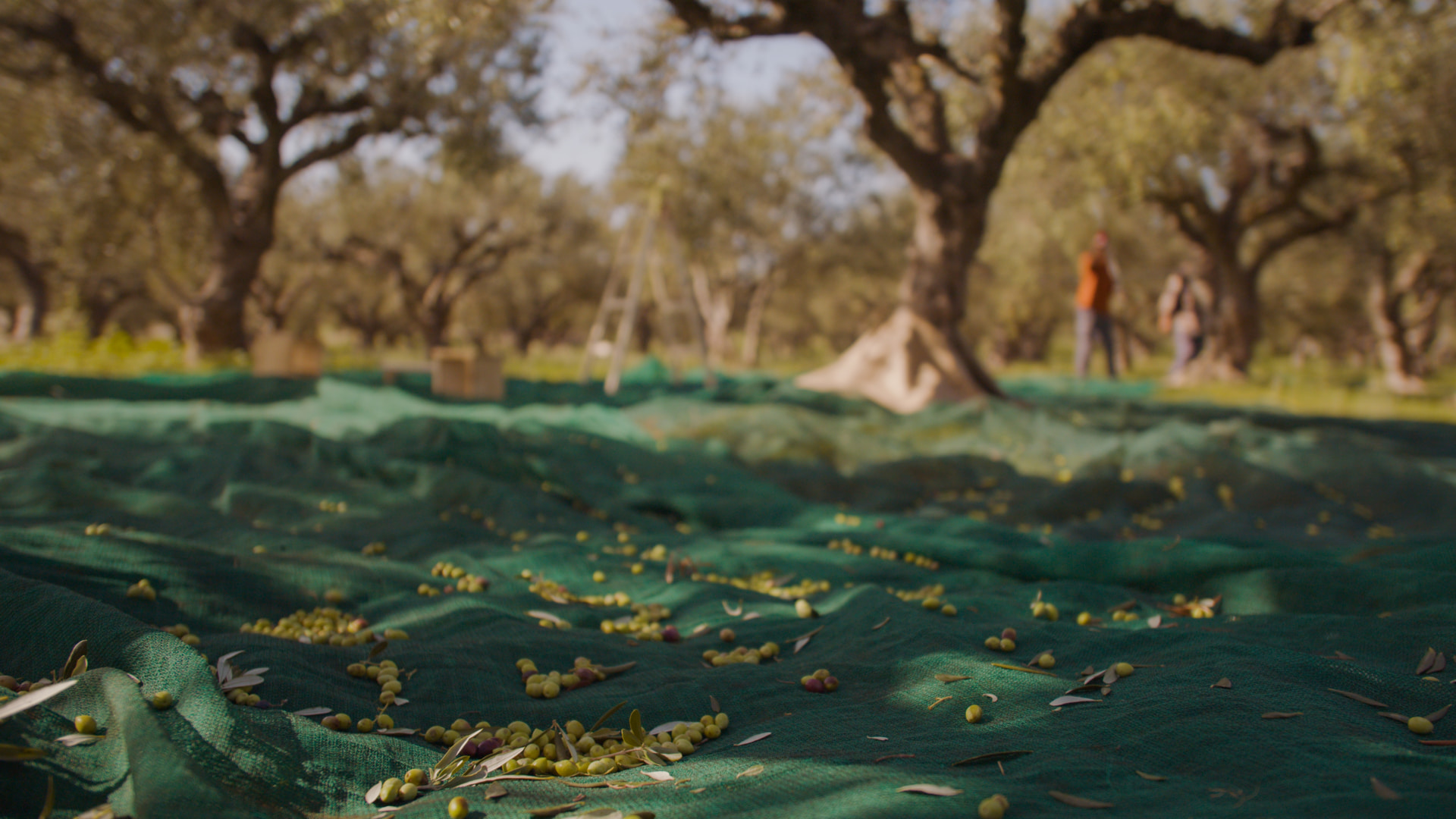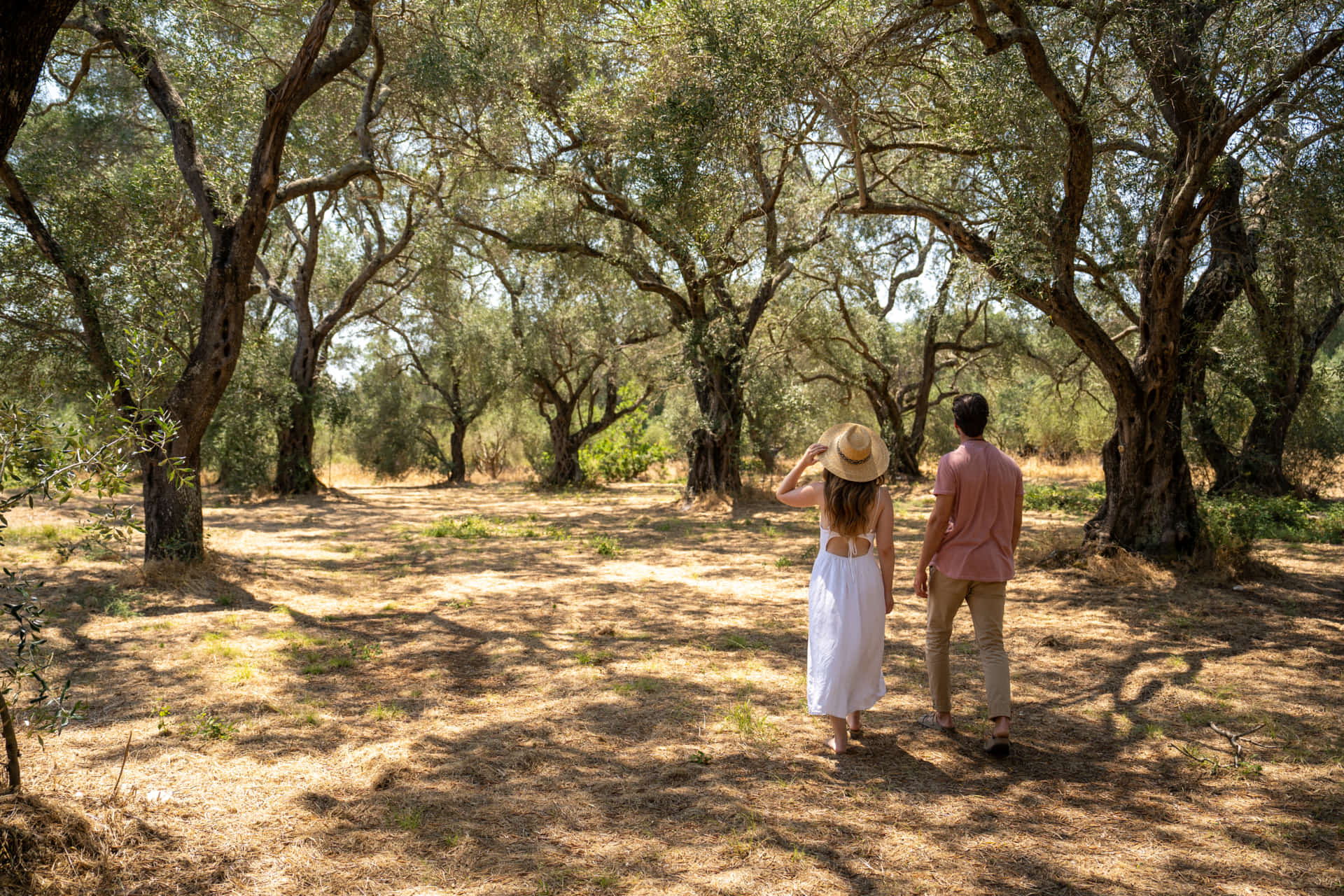How to experience the olive harvest in Greece
There’s no better way to get to know the significance of the olive for local communities and to enjoy the Greek countryside at one of the most magical times of the year. So here is everything you need to know about when, where and how to take part in the olive harvest in Greece.
A yearly gift from the gods
The olive harvest season in Greece typically runs from late September to late January, depending on the region, altitude, variety and cultivation goals. Each olive variety follows its own cycle (early or late flowering, fruiting and ripening), so the picking can take place earlier or later in the year. The flavour profile of the olive oil is strongly influenced by the stage of ripeness: an earlier harvest usually produces oil that is more bitter and peppery, while later harvesting results in a milder, sweeter taste. In practice, early harvest takes place from early October to late November, producing agoureleo (olive oil made from unripe olives).
The most common period for harvesting is when the fruit has ripened (turning from green to purple/black), usually in November-December, as this ensures a better yield of oil and a balanced quality. In cooler areas, or depending on the weather, the process can continue into January.
Greek olive harvest techniques
Different techniques are used during the olive harvest in Greece, depending on the desired quality and the equipment available. The most traditional method is hand-picking, where each olive is gathered onto nets or cloths with minimal damage – ideal for table olives.
More common for olives destined for oil is branch beating, where flexible rods are used to gently strike the branches so the fruit falls onto the nets, requiring skill to avoid harming the tree or olives.
An intermediate method involves combs (manual or powered), which brush through the branches to detach the fruit. The most automated technique is mechanical shakers (trunk or branch), which quickly bring down the olives onto collection nets and reduce the need for labour. The choice of method depends on the goal: for intact fruit (such as table olives), hand-picking is preferred, while for speed and volume in oil production, mechanical methods are often used with careful handling.

How to take part in the olive harvest in Greece
As one of the world’s most important olive-producing countries, Greece often relies on extra hands to make the process more efficient. The most rewarding destinations to join an olive harvest experience are those with intensive cultivation and a long tradition of olive oil production, such as Crete (throughout the island), the Peloponnese (specifically Kalamata and the wider Messinia region, as well as parts of neighbouring Laconia) and Magnesia in the Thessaly region of Greece. Large-scale olive-producing islands include Lesvos and Corfu.
You’ll find organised activities offered by local mills and growers, ranging from joining the harvest itself to informative workshops and short seminars on olives and olive oil. Some even include cooking with fresh olive oil, and in certain cases, multi-day escapes with accommodation on a farm or right next to the olive groves.
At the same time, farming communities and cooperatives across Greece invite the public to join the autumn olive harvest as part of festive events and seasonal celebrations. Examples include the Olive and Olive Oil Festival in Kranidi, in the Argolida region of the Peloponnese, the Olive Oil Festival in Naxos, and the Elaia festival in Kissamos, in Chania, western Crete. There are even harvest initiatives in Athens, organised by municipal groups to preserve the scattered urban olive groves still found around the city. One example is the harvest in the municipality of Alimos, where locals are invited to collect olives from trees in public spaces. Others include the Stavros Niarchos Foundation Cultural Centre’s educational harvest programme in its park, and a truly special experience – harvesting olives in the small grove of the Acropolis Garden.
Why take part in the olive harvest?
Whatever form you choose, joining the olive harvest in Greece gives you hands-on knowledge about caring for and managing olive trees, as well as ensuring a healthy crop the following year and the sustainability of the grove.
You’ll learn about the equipment and techniques used by producers and understand the life cycle of the olive – from flowering and fruiting to pressing and storing the oil. At the same time, you connect with a tradition that goes back centuries, with the olive serving both as a product and as a cultural symbol. Beyond learning, the olive harvest is also a social experience: you share the rhythm of the fields with other participants, discover different tastes together, exchange stories, and feel first-hand the warmth of Greek hospitality and sense of community. Whether you stay a few days in an olive grove or join for just a few hours, you’ll leave with new skills and human connections that stay with you.

A unique way to connect with Greece
So if you find yourself in Greece at the right time of year, it’s worth setting aside a little time to be part of this unique process and to take away knowledge, memories and of course exceptional olive oil! Taking part in an olive harvest experience is far more than just an outdoor activity. It’s a chance to connect with nature, meet local communities, and understand a multifaceted tradition that has been kept alive for centuries.
Discover Greece Your Way
Discover authentic local experiences and secure your bookings for activities and tours with our official online rates.
Chania's Old Town and Street Food tour
The Chania Jewish private tour
Chania: Full Moon Olive Harvest by Kera ...
Rethymnon: Explore the Secrets of Wine a...
Heraklion: Treasures of Crete by Scalare...
Chania: Terroir Tasting & Tour in Manous...
Nikos Apartments Stalis
Paralos Kosta Alimia
Holiways Villas Crete
Mylostassi Villas Crete
Flamingos Hotel
Discover the highest-rated ground transportation services for travelers, based on reviews across Google, Tripadvisor, and Trustpilot.
Welcome Pickups offers a seamless, safe, and enjoyable experience for travelers
Trained Drivers
Hand picked & trained drivers
Low prices
Same price as a regular taxi from the line
Arrival monitoring
Drivers are always on time
Quality support
24/7 email & phone support


